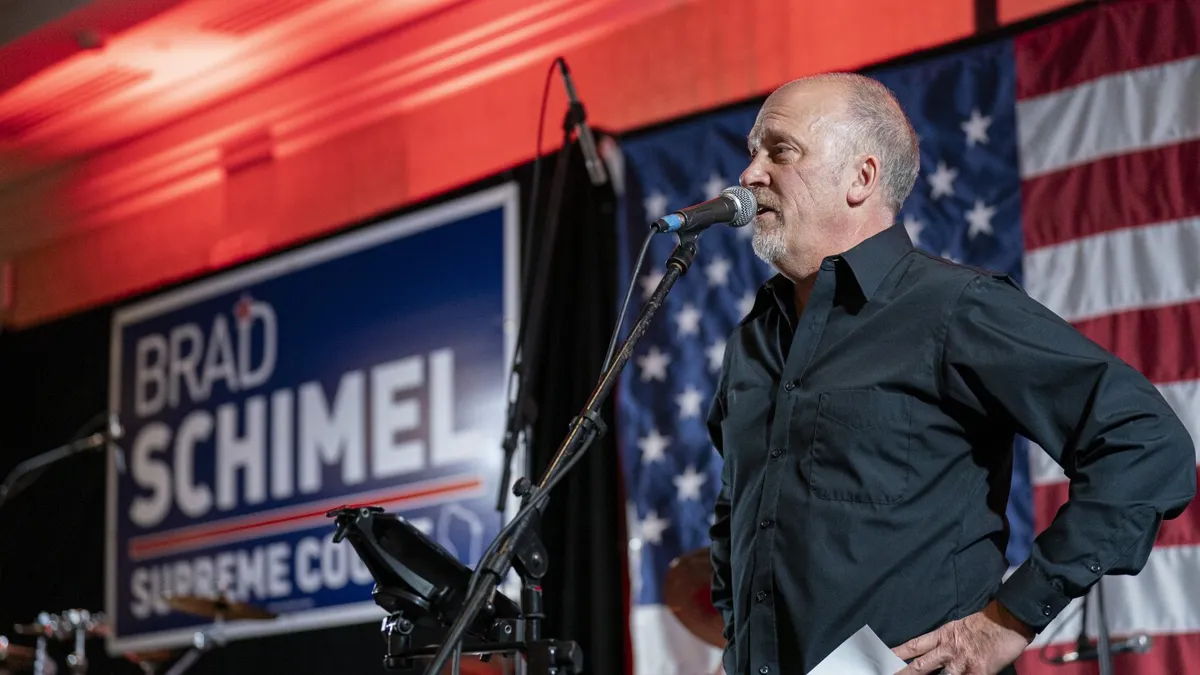
A trio of elections held on Tuesday has provided significant early warning signs for Republicans and President Donald Trump as they embark on an ambitious new term. These elections highlighted a strong Democratic backlash against Trump's efforts to reduce the size of the federal government, as well as his controversial ties with billionaire Elon Musk.
The marquee race for a Wisconsin Supreme Court seat saw a substantial defeat for the conservative judge endorsed by Trump and supported by Musk's groups, which contributed an impressive $21 million to the campaign. This loss was especially notable in a state that Trump had previously secured in the November elections. Despite Florida Republicans maintaining control over some of the most pro-Trump House districts, both candidates performed significantly below the margins Trump achieved just months prior.
These elections, marking the first major contests since Trump's return to power, serve as an early gauge of voter sentiment. Trump is currently pushing to dramatically reshape the federal government, often clashing with the courts while seeking to assert the limits of presidential power.
Historically, the party losing the presidency in November tends to gain seats during the subsequent midterm elections. Tuesday's results have sparked optimism among Democrats, who have faced intense scrutiny regarding their strategy in response to Trump. They believe these trends could signal a positive shift for their party moving forward.
Conservative activist Charlie Kirk, whose organization collaborated with Musk to support candidate Brad Schimel in Wisconsin, emphasized that the Supreme Court loss reveals a significant challenge for Republicans, particularly in elections without Trump on the ballot. “We need to recognize that we are the LOW PROP party now,” he stated, referring to the low-propensity voters who seldom participate in elections. Kirk also pointed out that without a change in strategy, special elections will continue to pose challenges for the party.
Trump narrowly won Wisconsin in November by a mere 0.8 percentage points, equating to fewer than 30,000 votes. However, the recent elections demonstrated a noteworthy leftward shift in this critical battleground state. For example, Sauk County, a key indicator of statewide trends, flipped significantly towards Judge Susan Crawford, the liberal candidate backed by national Democrats and influential donors like George Soros. Crawford achieved better-than-expected results in suburban Milwaukee counties, traditionally strong Republican areas.
In conversations with over 20 voters in Waunakee, a politically diverse town near Madison, many Democrats indicated that their votes were not just about the court's direction but also served as a repudiation of Trump’s early presidency. “This is our chance to say no,” said Linda Grassl, a retired OB-GYN nurse, after voting in Waunakee. Others expressed concerns about Musk's financial involvement in elections, asserting that voters should have the autonomy to choose their candidates without external influence.
Former Wisconsin Governor Scott Walker cautioned Republicans against drawing sweeping national conclusions from the election outcomes. He emphasized the challenge of linking the Supreme Court race to Trump in a state judicial election, noting that many Trump supporters may not typically engage in such races. “What does this have to do with Trump?” he speculated voters might ask.
On a brighter note for Republicans, Florida saw some success with Randy Fine winning a special election in the 6th District to replace former Rep. Mike Waltz, who stepped down to serve as Trump’s national security adviser. However, Fine's victory margin was significantly reduced compared to Waltz’s prior win. In another race, Jimmy Patronis, the state’s chief financial officer, overcame a challenge from Democrat Gay Valimont, but also fell short of the previous margin achieved by Matt Gaetz.
Despite these mixed results, the underlying theme for voters in both districts remains clear: loyalty to Trump. Many voters, including Teresa Horton, 72, indicated they were unfamiliar with the candidates but chose to support them based on their alignment with Trump’s agenda. “I just went with my ticket,” she remarked.
Brenda Ray, a retired nurse, echoed similar sentiments, stating her support for Patronis was primarily due to her belief that he would “vote with our president.” This ongoing allegiance to Trump underscores the complexities facing the Republican Party as they navigate the upcoming political landscape.
Michael Whatley, chairman of the Republican National Committee, suggested that the results signal a strength within the party. “The American people sent a clear message tonight: they want elected officials who will advance President Trump’s America First agenda,” he stated, reinforcing the importance of Trump’s influence on the electoral process.